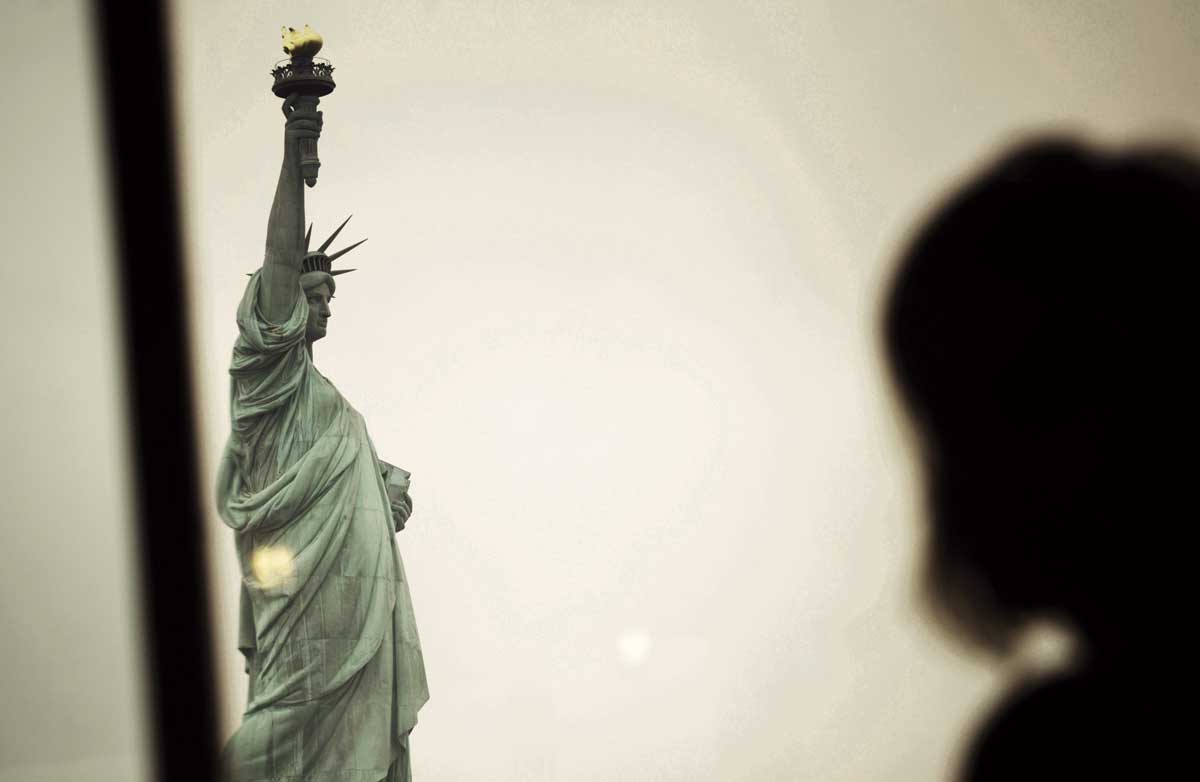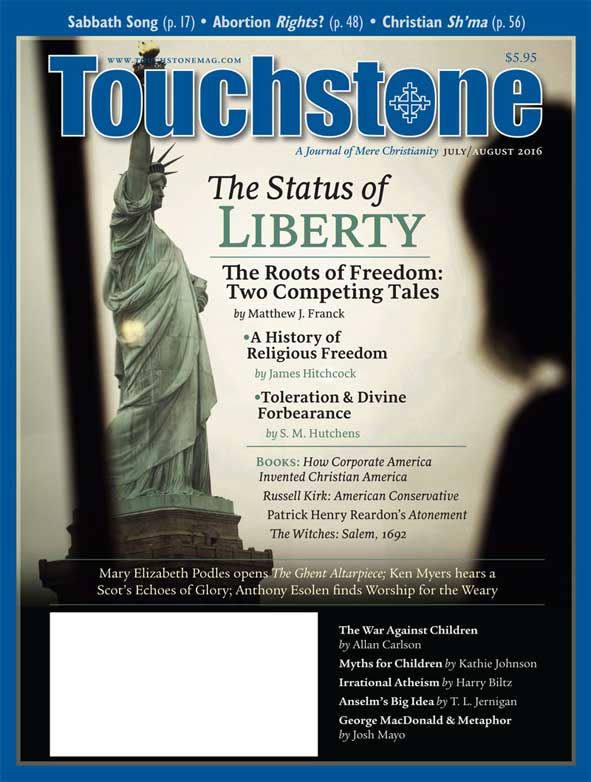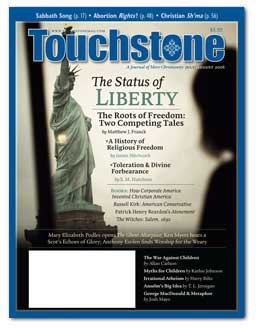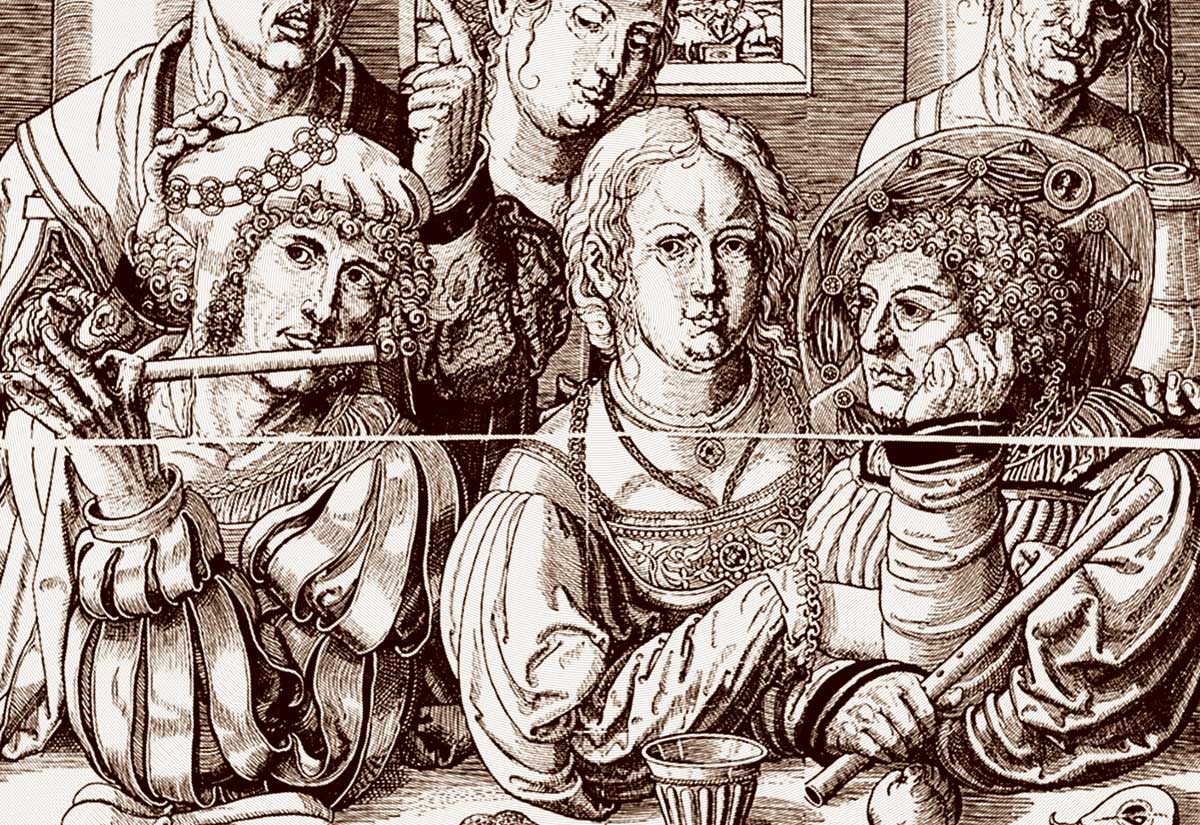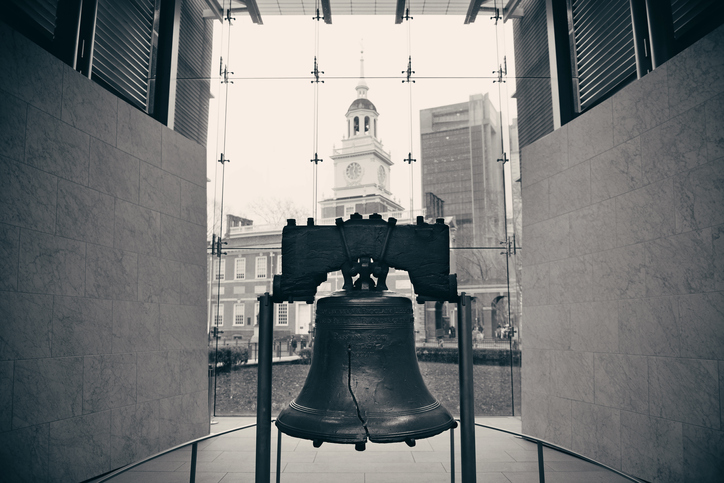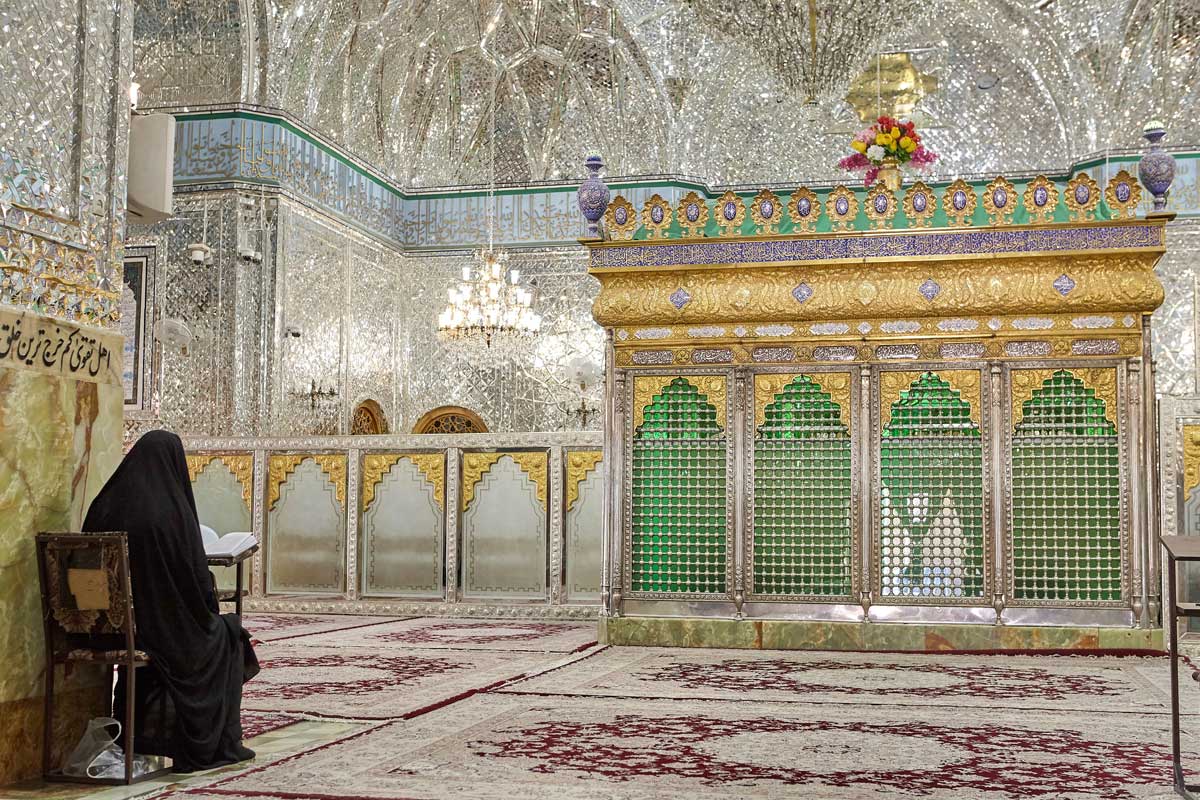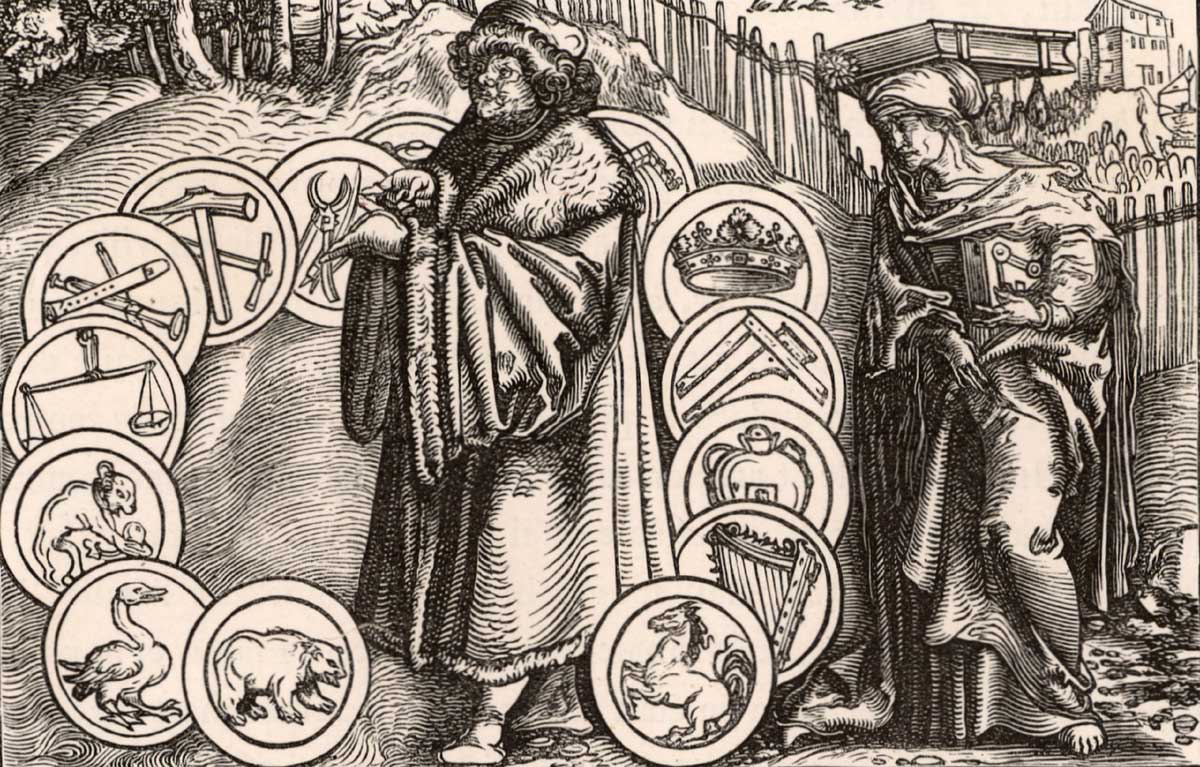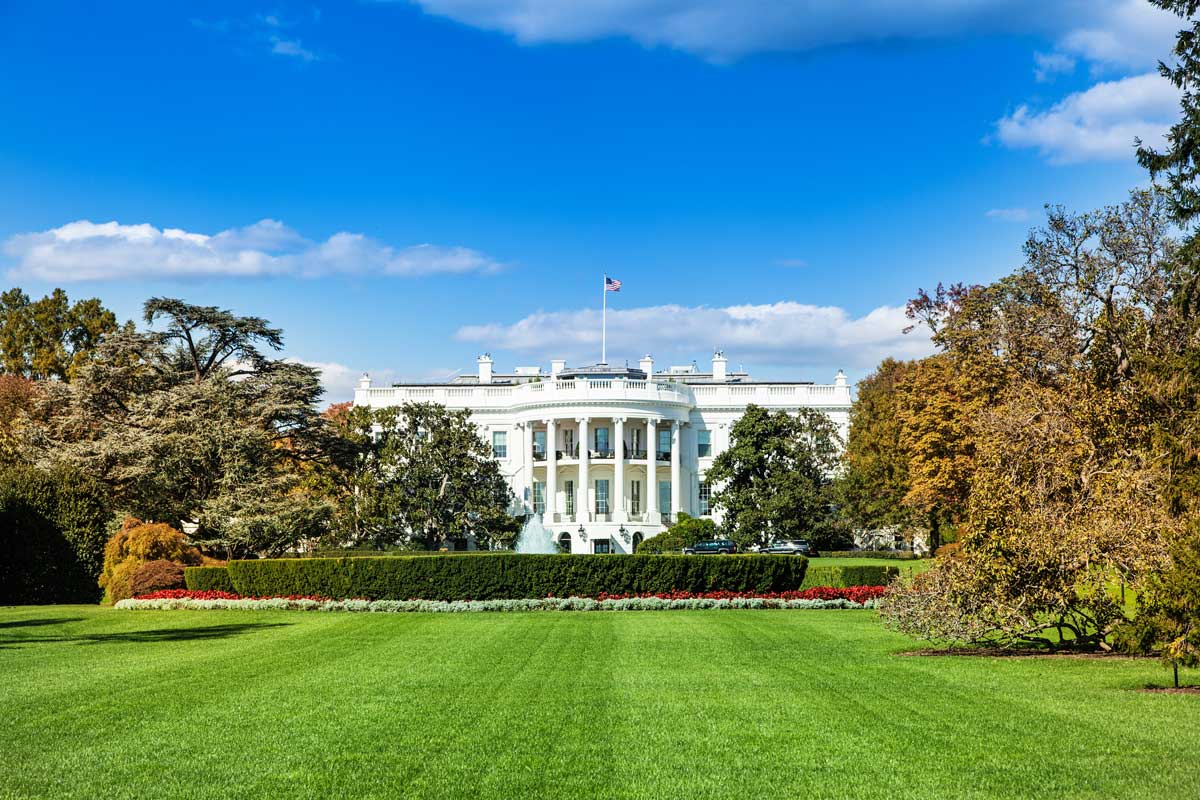Forum: Feature
Two Tales of Freedom
Getting the Origins of Religious Liberty Right Matters
Around the world, religious freedom is threatened. In some places the threat is immediate and deadly, as when the terrorists of the Islamic State murder Christian martyrs for an international audience, and openly avow their intention of wiping out ancient communities of Jews, Christians, Yazidis, and Muslims who do not conform to their views. In other places the threat seems trivial by comparison, since no physical violence is employed, yet quite real pressure is applied, as when Catholic Charities adoption services lose their state licenses because they will place children only with families headed by a married man and woman, or when the federal government threatens the Little Sisters of the Poor with crippling fines because they will not compromise their witness to the Church's teaching on contraception.
In all these cases the freedom to witness to the truth is under assault. But let us not forget that the first requirement of bearing witness to the truth of one's faith is to live that truth, to act on it, in public as well as private. It is a poor witness who is reduced to saying, "Here is what I believe is right and good and true, but I do not live according to it because others with power over me will not permit it." To say the truth but not live it is a pitiable condition—and if we are not permitted to live the truth, it will not be long before we are not allowed to say it, either. It is imperative, therefore, that we never retreat from "I will" to "I would but cannot."
One reason why religious freedom is in trouble is that its intellectual underpinnings are misunderstood. This is a problem both philosophical and historical, and it can be traced to the choice our culture has made between two stories of religious freedom's origins.
The First Origin Story: The Myth of the Secular Enlightenment
According to the standard account widely taught today, religious freedom was a discovery, or invention, of the secular Enlightenment—perhaps somehow springing fully grown from the brow of Thomas Jefferson, though its origins might be traced to earlier thinkers such as the seventeenth-century Englishman John Locke. The narrative thread here is that, following the violence in the name of religion that underlay the Thirty Years' War and the English Civil War, a hardy band of revolutionary thinkers, intent on achieving peace and stability, developed wholly new political principles that would reduce the chances of such conflict in the future. As the historian of Christianity Robert Louis Wilken has written, in this account John Locke was "the architect" of religious freedom and his Letter Concerning Toleration, published in 1689, was the "charter document" of the new politics.
In this origin story, the political and legal principles of religious freedom were the work of thinkers who were secular, Deist, or irreligious, and who preached a rigorously secular politics of radical individualism, in which religion is essentially privatized, i.e., relegated to the church on days of worship and to the home on every other day. The most salient political feature of religion, in this view, is that it causes conflict and division wherever there is a plurality of religious beliefs. This means that either the state must adopt one religious dispensation as the officially established church and brook no competition with it—the option recommended by Thomas Hobbes in the mid-seventeenth century—or it must see to it that religion is strictly separated from political life, so that its many voices are neutralized—the view attributed (rightly or wrongly) to Locke.
In the United States, accordingly, this origin story sees the "no establishment" provision of the First Amendment as our most important constitutional principle. As Leonard Levy, a secularist historian of this constitutional provision, said three decades ago, "the establishment clause functions to depoliticize religion; it thereby helps to defuse a potentially explosive situation. The clause substantially removes religious issues from the ballot box and from politics." The upshot of this reading of our constitutional principles is that all expressions of religion in the public square are treated with suspicion as the harbingers of an incipient theocracy, a theocracy that would move from the potential to the actual if the particular religious view on offer were to become influential in the making of public policy.
Other interesting conclusions follow from this secularist or "separationist" view of the relation between religion and politics. One is that we could do with a lot less of this dangerous sort of thing, and that it would therefore be altogether good if the freedom to profess any faith, coupled with a strict rule that religious considerations never intrude on our political life, resulted in the gradual attenuation of religion altogether—the "secularization" of society being an expected and welcome result of modernization and the spread of freedom. Religion is "potentially explosive"; freedom of religion makes it less so, and it does this chiefly by leading people gently out of their benighted condition as religious believers into more rational ways of thinking by introducing them to one another across the lines of difference, until each one realizes he has no true ground to prefer his own inherited belief to another and comes to believe it less and less. Thus does a free society proceed from toleration of religious difference to the positive achievement of religious indifference.
As one can already detect, there is a strong prejudice in this secularist origin story—where there is not in fact an outright declaration—that religion is irrational. This prejudice may make its appearance in a soft form, holding that religion has to do with matters beyond the reach of reason—so far beyond, in fact, that religion resonates on an altogether different and incompatible wavelength from the one where reason functions. Religion is "spiritual" or concerned with "higher values" or "eternity," but here on terra firma we had better take our bearings, in our social and political life together, from principles that our shared practical reason can adjudicate. Consider this the "religion is too lofty and therefore irrelevant to earthly affairs" prejudice.
But this soft, seemingly friendly view of religion easily converts into its much more hostile sibling—the view that religion is not so much beyond reason as beneath it, belonging to an earlier age of mankind's infancy, an age of superstition and mumbo-jumbo. This is the "religion is backward and gets in the way" prejudice, and it has shown up in the most respectable circles ever since Karl Marx declared religion the "opiate of the masses," something hindering society's progress but on its way to extinction in any event. So the atheist scholar Daniel Dennett believes that in our information-saturated age, religion is—happily, in his view—on the way out because the leaders of faith communities cannot keep their flocks from educating themselves in ways that will shake their devotion to old beliefs that depended on their ignorance of alternative ideas.
Dennett stands as a perfect representative of the mythical origin story I'm describing. The Enlightenment was all about introducing into the world, for the first time (at least on a large scale), the idea that reason and faith are at odds, that the freedom to believe whatever one wishes to believe will be immediately good for peace and the avoidance of conflict, but over the longer term will be better still for its effect in relegating religion to the past. Society will shed religion like a serpent sheds its old skin, and will enter a new Garden of Reason, where conflict on the basis of religion will be unthinkable because religious faith itself will have become impossible to cling to.
Even while paying lip service to freedom of religion and the rights of conscience, many of our political and social leaders today operate on something like the assumptions I have been describing—namely, that the soil from which religious freedom sprang was a deep skepticism or enmity toward religious faith, and that the chief benefit of religious freedom in the long haul will be the final disappearance of any religion about whose freedom we need concern ourselves. In the meantime, on this side of that happy culmination, these presuppositions can explain a great deal about our current religious freedom controversies. More on that after I describe the other origin story about religious freedom—the one that happens to be true.
One last point, however, to spin out the implications of this first origin story. In the secularist account, religious communities and relationships, and religious works and purposes, are treated as one species of the genus "civil society," and so are lumped in with other forms of private association and enterprise that people might engage in. All such private associations, from the business corporation to the medical society to the soup kitchen, from the university to the charitable aid society to the sporting club, are forms of human organization in which individuals jointly pursue some very particular kind of good. And all of them are strictly voluntary, with individuals entering and exiting them according to their interests and inclinations at any moment.
In the standard-issue secular account of Western liberalism, the Church, too, is merely one of the subsets of the larger set of such joint pursuits, and it is not a particularly special one. It, too, is seen—where it is not viewed with outright hostility—as pursuing a good that is narrow and particular, a quality it has in common with the bowling league or the blood bank. Only the state seeks the good simply or in general, and only the state has the proper status of being the arbiter of all other associations' claims to be acting in the name of some particular good. Religion is the particular, politics the general, when we come to tally the goods each one pursues. Believing this account of their relationship will naturally color one's understanding of which holds the principal authority in life, and which is in a position to instruct the other.
The Second Origin Story: The Religious Basis of Religious Freedom
The true story of religious freedom is rather different from the standard account regarding the secular Enlightenment. The true origin story is that the principles of religious freedom grew, not without pain and struggle, out of Jewish and Christian reflection on the human person as a being endowed with a dignity that is stamped on its nature as imago Dei, made in the image of God.
In this second, better origin story, the struggle for religious freedom long predates the Enlightenment, or the conflicts that arose during the Protestant Reformation. It can be seen far earlier, in the effort of the medieval Church to gain its independence from the kings of Europe. It can be seen in the challenge to political authority of the Christian apologist Lactantius, a contemporary of the emperor Constantine, who said religion "cannot be coerced" but must be the commitment of a free will. Earlier still, this principle can be seen in the thought of Tertullian, who wrote that "it is by free choice, not coercion, that we should be led to religion."
Our Scriptures themselves speak in the accents of the freedom to bear witness. As reported in the fourth chapter of the Acts of the Apostles, the rulers and priests and scribes in Jerusalem summoned Peter and John and "charged them not to speak or teach in the name of Jesus. But Peter and John answered them, 'Whether it is right in the sight of God to listen to you rather than to God, you must judge; for we cannot but speak of what we have seen and heard.'" In the fifth chapter of Acts, following some events too wonderful not to have impressed sensible men, the surprisingly unimpressionable high priest complains that Peter and the apostles have ignored these official commands to cease and desist, and Peter and his fellows answer simply, "We must obey God rather than men," and proclaim that "we are witnesses" to God's saving power.
In our own national history, this civilization-long origin story, once retold in full, restores to their pride of place the religious heroes of religious freedom—Roger Williams, the Baptists and Methodists of the two Great Awakenings of the eighteenth and nineteenth centuries, the Quakers and other Christian abolitionists, Bishop John Carroll and Bishop (and saint) John Neumann, the Mormons and Jehovah's Witnesses who faced persecution in more recent times, the Catholic and Anabaptist and Jewish and Orthodox believers who came to our country and founded thriving communities that became part of the American tapestry, the leaders of the African-American church who overcame Jim Crow with the power of moral suasion. And today we may add the Little Sisters of the Poor, and all those who stand fast against impositions on their consciences by official authority. These individual believers and their communities, not the secular separationists, are the real heroes of religious freedom in our history.
Recapturing and retelling our history in this truer way, we can glimpse a centuries-long development of free societies, a distinctively Western contribution to human flourishing, and thus, inescapably, a Christian contribution to it. One culmination of this development is American constitutionalism, which owes much of its success and longevity to the religious impulses of the American people. Let me underscore that: what is good and just about the American political order came about not despite but because of its people's religious faith. American
politics is founded, as the Declaration of Independence tells us, on a belief in the fact that we are all "created equal" and in the "unalienable rights" that God has given each and every human person.
In this respect, our politics rest, at bottom, on a faith in the ineradicable dignity of every human person. But this is not a teaching of radical individualism, of every man for himself and the devil take the hindmost. It is bound up with an understanding of our mutual dependence upon one another in political communities where ultimate earthly sovereignty rests on all our shoulders, together, as the parties finally responsible for the justice or injustice of our government.
With this burden resting on us all, it is no wonder that a religious people—as most Americans have always been—should give thanks to the God who made us, who gave us the burden of self-government, and who alone can lighten it for us and make us capable of bearing it. And so, from our earliest history, we see that the faith of Americans has been welcomed in the public square, and that acknowledgment of our dependence on the Almighty, and of our trust in divine Providence, has been part of the public life of the nation.
In this account of religious freedom's origins and principles, we see things very differently than in the secularist account. As the late Fr. Richard John Neuhaus once put it, "It is not chiefly a secular but a religious restraint that prevents biblical believers from coercing others in matters of conscience. . . . we believe that it is the will of God that we should not kill one another over our disagreements about the will of God." Fr. Neuhaus was not trying to whitewash the record of religious strife and oppression in the history of Christianity, and neither am I. No human struggle to bear witness to the truth is without its dark chapters of failure and sin. But Professor Wilken is surely right to say that by the time we get to the teachings on toleration of John Locke at the end of the seventeenth century, we would have to have blinders on not to see that "his work is saturated with Christian assumptions," and that "his thinking cannot be understood without reference to Christianity." The story of religious freedom is, in some sense, a tale of Christianity purifying itself.
In the case of this true second story, as with the mythical first one, there are certain conclusions that spin out of it. First, while some countries, such as England, have found that religious freedom can coexist with some form of established religion, here in America we reject that, making churches the paradigm case of voluntary association, with none preferred over others. But unlike in the first origin story, the faiths of all, and the motivations of faith, are welcome in the public square, and are in themselves no cause of division and discord—no more than are any views strongly held on nonreligious grounds.
But religious communities and their works are not just the paradigm case of voluntary association. They are a special and distinctive case, rightly set apart for unique constitutional protection. Religion, in any political order that protects religious freedom in full, is immune in many respects from the jurisdiction of state power, yet it also deserves fostering and encouragement by our political order. The space for religious communities and their works having been appropriately cleared, these communities bring other voluntary associations in their wake, and generate the great diversity and fullness of a healthy civil society.
Last and by no means least, religious freedom shields the one kind of institution in civil society that has the standing to rebuke the state's claim to being the ultimate sovereign, the arbiter of all claims to be acting in service of the good. Only religion can remind us all of a good that encompasses and then transcends political life. Only religion can remind us that the temporal ultimately answers to the eternal.
Why Religion Needs & Deserves Its Special Status
The proponents of the first origin story I told, the myth of the secular Enlightenment, regard the claims of religion as anything but distinctive. Churches and other religious associations, communities, and institutions are to be classed with any other social groups or undertakings that arise from people's strongly felt commitments—no different, as I said, from the blood bank or the bowling league. As the legal philosopher John Finnis has noted, this is a completely "external view" of religion. And it is unable to account for the appearance in our Constitution—or in the UN Declaration of Human Rights, for that matter—of a special status for freedom of religion, over and above other forms of freedom of association, or speech, or conduct.
But it is good to be prompted to think this through from first principles. Why should religion, and the freedom of religion, have a distinctive and special status in political life?
The answer begins with a fact that will appear to contradict something I said earlier, when I characterized religious communities as voluntary associations. In the sense that they should be understood as freely entered into, and freely exited, that was a true description. Yet at bottom, religion as an individual experience is in some sense non-voluntary. As the fathers of the Second Vatican Council said in Dignitatis Humanae, the 1965 Declaration on Religious Freedom, "the truth . . . makes its entrance into the mind at once quietly and with power." Some 180 years earlier, James Madison, in his famous "Memorial and Remonstrance Against Religious Assessments," said that "the opinions of men, depending only on the evidence contemplated by their own minds, cannot follow the dictates of other men." In each of these great documents of religious freedom there is a recognition that our belief cannot be compelled because it is compelled already, by our own best grasp of the truth. In this respect, religion is not so much chosen as it is accepted, as a truth one has discovered or has learned.
And while religious faith is not wholly explicable on rational grounds, it is bound up with the operation of our reason, as an effort to respond to whatever evidence we can grasp of the nature and meaning of our existence, and of its divine ground. Religion begins in intellectual and spiritual inquiry that is answered by reason and faith working together. And we have a duty to truth, a duty to follow where it leads, in recognition of an authority that is higher than any that men and women can assert.
But in bringing our intellect, our conscience, and our will to bear on the truth as best we can understand it, we necessarily attempt to align our lives and actions with this unseen order of reality we call divine. For how can we glimpse the most important truth about our lives—our relationship to the deepest reality there is—without attempting to live according to that truth?
Naturally, then, religious believers seek out the company of others who believe as they do, forming a community of faith with them. For these believers coming together, the truth is constitutive of their community, and the community represents the shared duty of each member to respond to that truth and the authority responsible for it. Such communities have a dignity of their own within the wider society, and should be protected in their ability to order their own affairs, to act on their religious teachings, and to engage fully with their fellow citizens in the public square, not with their light hidden under a bushel, but set out in the open, saying and living the truth as they understand it, and not facing any threat or penalty for doing so.
Compared to religion, it is politics that rests entirely on a voluntary basis. As the Declaration of Independence tells us, government "deriv[es] its just powers from the consent of the governed." In order to preserve our freedom, we agree willingly to a limited authority that we ourselves make. In some respects, we are also agreeing to limitations on our freedom—to a willing submission of our will. But only within limits. And religious freedom is the first of those limits on government, because our religious duties, which are for each of us non-voluntary in some decisive respect, cannot be surrendered or submitted to any merely human authority.
To turn again to James Madison's great Memorial and Remonstrance, our duties to the Creator are "precedent, both in order of time and in degree of obligation, to the claims of Civil Society." That phrase, "civil society," is carefully used by Madison because civil society is prior even to government—it is the aggregate of all the individuals who together give that "consent of the governed" that makes government in the first place. So if, as Madison says, "civil society" has no claims that can override our religious duties, it surely follows that government, which is society's limited creature, has no such claims.
The Consequences of Forgetfulness
Our present circumstances in the law and politics of religious liberty can be traced to a common forgetting of the true origins and principles of religious freedom, and a radicalization of the secularist myth. First, we forget or mistake the nature of the human person. The truth about religious freedom begins with men and women as imago Dei, the image of God. But what if man were just another piece of matter in motion, a bundle of passions and impulses? What if men and women were wills with no duties to any truth beyond themselves, making claims on their fellows for the protection and sheltering of their willful choices? Then religious claims would deserve no special or unique place, protected in law and sheltered from politics. All claims about human choices would be on an equal plane, to be honored or neglected according to how important or indifferent or harmless they seemed to others, or more precisely, to those others in a position of power to decide.
We can forget, too, that human beings are the makers of government, and turn instead to thinking of our relationship with the government as one in which we occupy the position of supplicant, of subject and not citizen. This can readily happen if we neglect the "unalienable rights" with which the founders said we were "endowed by [our] Creator." Then we would be susceptible to granting a privileged place to claims of equality or to rights that are purely conventional, that are not rooted in our natural rights or liberties. And once we did that, we would probably start treating all rights as negotiable privileges, to be weighed and "balanced" against each other when they come into conflict. Yet whatever comes in conflict with a fundamental right, properly understood, cannot itself be a fundamental right; it must either be a lesser or contingent right (as when my right to travel freely conflicts with authorities' efforts to contain an epidemic) or no right at all (as when the phony "right" to abortion conflicts with a baby's right to live).
When religious freedom is so reduced as to be one kind of right competing against other "rights" of presumptively equal standing, then naturally we empower government to adjudicate their alleged conflict with each other. Thus we commit a truly fatal mistake, of giving the government jurisdiction over questions of conscience. This may start with granting it jurisdiction over conduct that actually works harm to others or to the common good—a jurisdiction we would all accept—but if we have stumbled into all the mistakes I have just sketched, it can become in the end a jurisdiction that reaches belief itself. For remember, wherever the secularist myth fully takes hold, the relationship between religion and politics is invariably viewed as one in which religion is a threat to politics, rather than politics being a threat to religion—just the opposite of the view held by the framers of our Constitution and First Amendment.
A Conflict of Visions
Reflect for a moment and you will realize how many of our struggles over religious liberty take place on the battlefield where our "culture wars" are waged, involving such issues as abortion, homosexuality, and the claims of equality and rights that are pressed in constitutional law, in legislation about "discrimination," and in the social norms that govern our marketplace, our schools and colleges, and other areas of civil society. Our conflicts over religious freedom are becoming more acute today because the aggressors in the culture war have gained enough ground to dictate public policy in ways that impinge on the consciences of their opposite numbers—those who defend the sanctity of human life from conception to natural death; who defend the meaning of marriage as the conjugal union of a man and woman, oriented toward childbearing; and who insist on a traditional Christian—but not only Christian—sexual ethic.
What are the prospects for a peaceful understanding between these contending forces? The "progressive" side has already won a redefinition of marriage and is moving on to "trans rights" while continuing its devotion to the unrestrained abortion license; the "traditional" side merely seeks the autonomy of its religious communities, ministries, and institutions, and the religious freedom of its faithful as they work, speak, and act in the public square. Can the progressive side, which is winning major new triumphs in the culture war, be induced to be magnanimous in victory, and respectful of religious freedom in full?
The prospects for such a peace are bleak. For the roots of the conflict can be seen in the two origin stories of religious freedom with which I began. On the traditional side, the principles that undergird and justify religious freedom begin with fundamental reflections on the human person as made in the image of God, and with obligations to our Creator. We are, like the centurion in the Gospel of Matthew, persons under authority. Or as John Henry Newman said, "conscience has rights because it has duties." This view is present in the American founding as well; the Virginia Declaration of Rights (written just before the Declaration of Independence) referred to religion as "the duty we owe to our Creator and the manner of discharging it."
In this vision of religious freedom, limits on the scope of earthly authority spring precisely from the obligation we have to an Authority higher than any earthly one. The felt obligation that calls traditional religious communities to perform their works of mercy and to serve their neighbors is the same obligation that calls them to follow biblical morality in matters related to sex, marriage, procreation, and the family. And it is the very same felt obligation that calls the members of these communities, in all charity and good citizenship, to insist on their freedom to live by these moral strictures in their relations with their fellow citizens in the marketplace and other social arenas, whatever the law may say.
On the progressive side, however, the other origin story holds sway—the myth of the secular Enlightenment. There the commonplace view is that religious freedom has no special or privileged place in our law and politics, that it may be subordinated to other claims of equality, freedom, or autonomy, and that (as three justices of the Supreme Court said in a 1992 abortion case) "at the heart of liberty is the right to define one's own concept of existence, of meaning, of the universe, and of the mystery of human life." In this account, religious freedom was an invention of modern thinkers who were intent on weakening religious faith, or at least its social power and political relevance, by ushering it out of the public square, where it generates conflict, and confining it to the hearth at home and the altar in church. In our own time, the adherents of this view appear to believe that religious freedom has reached its sell-by date.
Our duty is to tell the true story of religious freedom, to witness to the truth about the human person, and to defend the liberty of individuals, families, communities of faith, and their ministries to speak, act, and live the teachings of their faith in every corner of the public square as well as in the private spaces they have a right to claim for themselves. This will take perseverance in presenting our arguments in season and out of season. It will take courage, often in the face of ridicule, accusations of bigotry or hate, and even threats of legal punishment. It will take patience and charity, as we offer the truth in loving witness to our fellow citizens. And it will take much prayer, asking God for the strength to carry on in a duty that we owe above all to him who made us, and who loves us. •
Religious Cases in Point
Some contemporary examples will show that conceptual errors about religious freedom's origins and principles have real practical fallout:
• In 2004, the Christian Legal Society, which organizes student chapters at law schools, was told by a state university law school in California that it could not order its own affairs by insisting that the student officers of the chapter conform to Christian ethical standards. The university insisted on an "accept all comers" policy that was actively hostile to the purpose of the CLS, which is to forge an intentionally Christian community among its members. The CLS chapter brought a suit that eventually reached the Supreme Court, where in 2010 it lost in a 5–4 decision.
• In 2012, the Obama administration lost a Supreme Court case in which it argued that the principles of the First Amendment carve out no "ministerial exception" from federal employment laws that prohibit discrimination. The Court rejected this position unanimously, but the astonishing thing was that the government made the argument at all, insisting that religious institutions should be treated no differently than other forms of private association and that religious freedom was a disposable freedom—as though there were no special mention of it in the First Amendment—when it came up against the demands of "equality" in employment law.
• In 2011, the Obama administration first announced the HHS mandate, which compels employers of 50 or more persons to provide for no-cost contraceptives, abortifacients, and sterilization services in their employees' health insurance plans. The mandate included only the narrowest exemption for houses of worship and was only slightly modified in response to criticism. The government contended, until its 5–4 loss in the Supreme Court's 2014 Hobby Lobby decision, that no owners of a for-profit corporation could claim any protection from federal religious freedom laws.
• Despite its loss in Hobby Lobby, the administration continues to press its case for the HHS mandate in ongoing litigation involving religious institutions and communities, including the University of Notre Dame, Wheaton College, Priests for Life, and the Little Sisters of the Poor. The essential argument deployed in these cases is that these institutions and ministries are not sufficiently "religious" to be relieved of the requirement that they violate their consciences under the law.
• In both Massachusetts and Illinois, new state licensing requirements insist that private-sector adoption agencies must be willing to place children with same-sex couples. Since Catholic Charities will only place children with a married mother and father, their adoption agencies in both states have closed rather than violate Catholic teaching regarding the family and the welfare of children. When such large-scale adoption agencies vacate the field, many children and families suffer.
• In several high-profile cases, bakers, florists, photographers, and other providers of wedding services have been targeted for legal penalties if they decline to provide such services for a same-sex wedding or civil union ceremony. In no case have any of these business owners been guilty of refusing service on the grounds of sexual orientation. What they have claimed is a freedom to obey the teachings of their religious faith regarding the true meaning of marriage. Some of them have also claimed the protection of state laws designed to shield religious freedom and provide room for exemption from otherwise mandatory legal requirements. So far no business owners have won such claims in court.
• Despite this track record of state laws largely failing to protect religious liberty, the passage of a new such law in Indiana in April 2015 occasioned such an explosion of controversy that the legislature and Governor Mike Pence immediately rushed to replace the law with a new one so watered down that it raises questions whether it protects religious freedom in any meaningful way at all.
• Also in April 2015, during oral arguments in the Obergefell case on same-sex marriage, Justice Samuel Alito asked Solicitor General Donald Verrilli (who represented the government, taking the side of the plaintiffs in favor of same-sex marriage) whether, in a future legal landscape with same-sex marriage guaranteed as a federal constitutional right, there would be any danger to the tax-exempt status of religious universities and other ministries that are unwilling to recognize same-sex couples as married. Mr. Verrilli said, "it's certainly going to be an issue. . . . I don't deny that." Then, in a July 2015 Senate hearing, Sen. Mike Lee of Utah asked IRS Commissioner John Koskinen whether, in the wake of Obergefell, the Obama administration planned to revoke any nonprofits' tax-exempt status on such grounds. Mr. Koskinen could only assure him that there were no current plans to do so, but he did not forswear pursuit of such revocation as a matter of any principle of religious liberty.
• The Supreme Court's June 26 ruling in Obergefell, in which five justices decreed that all fifty states must license same-sex marriages, was remarkable (in a case not concerned directly with freedom of religion) for the attention paid by the dissenting justices to potential threats to religious liberty arising from the ruling. Especially worth reading are the dissents of Chief Justice Roberts and Justice Thomas, who worried explicitly and at length about the "ominous" and "potentially ruinous consequences for religious liberty" that the ruling represents. Justice Alito, also dissenting, said that the Court's ruling was bound to be "exploited by those who are determined to stamp out every vestige of dissent." This, too, may be understood as a reference to specifically religious dissenters.
—Matthew Franck
Matthew J. Franck is the director of the William E. and Carol G. Simon Center on Religion and the Constitution at the Witherspoon Institute in Princeton, New Jersey.
subscription options
Order
Print/Online Subscription

Get six issues (one year) of Touchstone PLUS full online access including pdf downloads for only $39.95. That's only $3.34 per month!
Order
Online Only
Subscription

Get a one-year full-access subscription to the Touchstone online archives for only $19.95. That's only $1.66 per month!
bulk subscriptions
Order Touchstone subscriptions in bulk and save $10 per sub! Each subscription includes 6 issues of Touchstone plus full online access to touchstonemag.com—including archives, videos, and pdf downloads of recent issues for only $29.95 each! Great for churches or study groups.
Transactions will be processed on a secure server.
more on Religious Liberty from the online archives
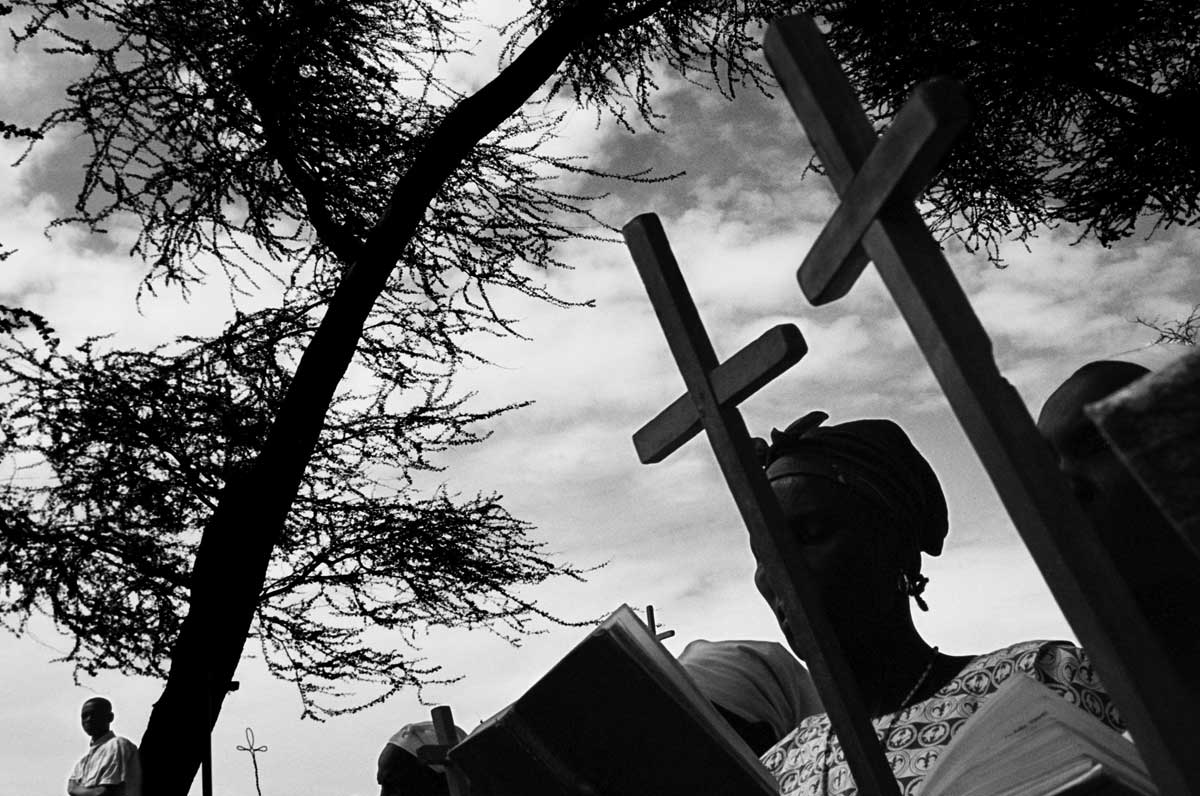
27.3—May/June 2014
Religious Freedom & Why It Matters
Working in the Spirit of John Leland by Robert P. George
more from the online archives
calling all readers
Please Donate
"There are magazines worth reading but few worth saving . . . Touchstone is just such a magazine."
—Alice von Hildebrand
"Here we do not concede one square millimeter of territory to falsehood, folly, contemporary sentimentality, or fashion. We speak the truth, and let God be our judge. . . . Touchstone is the one committedly Christian conservative journal."
—Anthony Esolen, Touchstone senior editor





